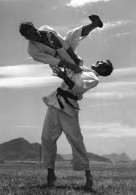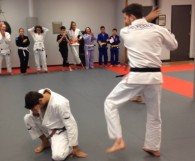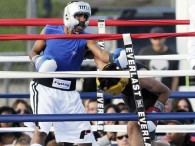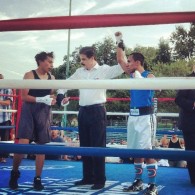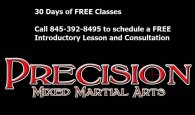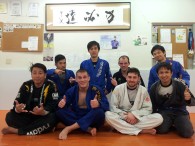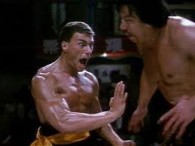Changed the format over at Learn to Grapple and went more in depth with a longer technique – enjoy
Brothers in Black Belts the Main Idea
Having a sibling on the mat almost always yields a synergistic effect. The combination of rivalry, support, understanding and accountability that brothers have with one another is a time honored recipe for success within Brazilian Jiu-jitsu. In Denville New Jersey there is another bloodline of black belts leaving their finger prints on the martial arts world – the Main Brothers.
Mikey and Andy always worked as a pair, each complimenting the other on their path. Andy is the leader, naturally assertive; aggressive in his training he pushes himself and his training partners. Tirelessly traveling, he constantly exposes himself to new ideas and training methodologies to avoid stagnating. Mikey was the innovator. Quiet and creative, he would take techniques and make them his own by finding new avenues of attack or combinations. His personality is laid back and relaxed and his techniques are a reflection of that, nothing is ever forced his game is smooth, flowing and efficient. They proved to be a perfect pairing. Mikey would make Andy more relaxed and technical, Andy would push Mikey to be more hardnosed and aggressive. Their symbiotic relationship was encapsulated in a mutual tattoo which reads “My brother’s keeper”.
Though their journey was forged together their destinations would be unique. Andy dove headfirst into the mixed martial arts world, which took him from the top shows in his home state, to the UFC’s Ultimate Fighter octagon, to the ring of Tokyo’s Pancrase. While Mikey’s passion lied on the tatami, he focused his efforts on becoming a grappling scientist, a top flight example of modern jiu-jitsu he quickly became one of the most feared brown belts in the northeast. His path has lead him to New York, California and Abu Dhabi as he put his version of the gentle art on display.
While their competitive goals were different, Andy and Mikey found their larger calling to be teaching. Together they share their passion inside the walls of Pure Mixed Martial Arts in Denville, NJ and it was on these mats in front of over 60 students, friends and training partners that Mikey Main was awarded his Brazilian Jiu-Jitsu black belt. Remarkable that despite being only 22 years old, the consensus was that his achievement of faixa preta was long overdue. The momentous occasion brought about a tidal wave of emotion that brought the normally even tempered Mikey to his knees. Achieving a Brazilian Jiu-jitsu black belt is not simply a change in wardrobe, but the culmination of supreme effort and the realization of a hard fought goal. Now that the Main Brothers have ascended to the rank of black belt it is only a matter of time before their names are spoken in the same breath as Gracie, Machado, Valente and Mendes as brothers who have forged jiu-jitsu dynasties.
Train with the top BJJ Black Belts in Rockaway, NJ at Pure MMA visit http://www.puremixedmartialarts.com
BJJ for MMA – Points to Consider
Here’s a guest blog I did for the guys over at MMA.TV on how to make sport BJJ more MMA applicable.
http://www.mixedmartialarts.com/news/446250/BJJ-needs-rules-changes-to-increase-fight-relevancy/
Precision Boxing in Poughkeepsie, NY
Fighters have different reactions to stepping in the squared circle. Some are overwhelmed by the experience, stress and pressure causes a sense of panic that disrupts their skills and timing. Others are too passive, they fail to rise to the occasion and have a performance that resembles a sparring match. Then there are those who relish the moment. They fight boldly and confidently assert themselves, they channel their nervous energy into a focused concentrated attack. Brandon falls into the latter category.
Sporting a pair of Captain America socks, complete with dual foam wings, he marched into the ring and immediately took control of the bout. Swarming his opponent with flurries of punches and relentless pressure the referee was forced to give his opponent multiple standing 8 counts. Brandon then began stalking his opponent making him flinch and over react with well timed fakes and feints, creating openings for power shots. Following the advice of veteran trainer Derrick Ohlhoff he continued his assault until the referee was forced to call a halt to the contest awarding Brandon the TKO victory.
Precision was the only mixed martial arts gym represented at the show. All other gyms were exclusively boxing based. However, despite housing multiple disciplines Precision showed they can more than compete with the best Poughkeepsie area boxing gyms.
Check out Precision MMA’s Boxing program for 30 days free visit http://www.poughkeepsieboxing.com
Precision MMA kids classes – more than just karate
Live in Poughkeepsie and want to enroll you kids in martial arts or karate classes? Check out Precision MMA, with kids classes 7 days a week in a beautiful 5,000 square foot facility Precision has something for everyone. Precision kids learn life skills along with their martial arts techniques, discipline, sportsmanship, hard work and dedication are the hallmarks of each and every one of our classes.
Fore more check out www.lagrangemartialarts.com
Stay Thirsty My Friends – Jiu-jitsu training post black belt
 At the end of this year I’ll celebrate my 15th year in Brazilian Jiu-jitsu and my 4th year as a black belt. One of the most satisfying things I’ve experienced over the past few years has been watching my longtime friends and training partners earn their black belts. The journey to faixa preta is arduous and many are lost along the way, seeing a friend cross the black belt finish line is a special thing to witness. As I’ve witnessed the graduation of many long time mat rats I have also seen a less encouraging phenomena spreading throughout the ranks of more senior black belts – a dire case of BJJ apathy.
At the end of this year I’ll celebrate my 15th year in Brazilian Jiu-jitsu and my 4th year as a black belt. One of the most satisfying things I’ve experienced over the past few years has been watching my longtime friends and training partners earn their black belts. The journey to faixa preta is arduous and many are lost along the way, seeing a friend cross the black belt finish line is a special thing to witness. As I’ve witnessed the graduation of many long time mat rats I have also seen a less encouraging phenomena spreading throughout the ranks of more senior black belts – a dire case of BJJ apathy.
Yes, sadly I witnessed a great many jiu-jitsu instructors completely lose their passion for the art. Some of them quit the art entirely; others are financially obliged to teach so they punch a time clock and go through the motions with the same enthusiasm you might expect out from an overworked busboy.
I first encountered this sad state of affairs as a blue belt. One of my instructors had gone on vacation for 2 weeks. Upon his arrival everyone was eager to hear about the details of his trip, one student asked if he did any training while he was away. I’ll never forget his response, “Do you go to work on your vacation? Jiu-jitsu is a hobby for you guys, but for me it’s my job”. His tone was so caustic, as if the concept of jiu-jitsu for pure enjoyment was completely ridiculous. I swore that I would never allow that to be my attitude. To this day I’ve never taken a vacation that did not include training, even if it meant rolling on the carpet in my hotel room.
Typically this feeling of indifference does not occur overnight. Generally, there are a few predictable phases that someone goes through before reaching this sour state of affairs. It usually starts with an injury of some sort, often times a fairly serious one. The black belt has a prolonged period away from the mat where they develop an interest in other hobbies that more strongly capture their enthusiasm. There are black belts I used to learn from and train with regularly that now lack the energy (or desire) to roll with me, but if I take them to a shooting range they suddenly have the exuberance of a kid on Christmas morning. I dabble in a few interests off the mat, but I never allow myself to get too heavily invested in them. I want my passion to remain teaching and practicing martial arts – period.
Even if the injury bug does not steer them to another hobby it can induce BJJ apathy in other ways. Many black belts use competition as a major driving force in their training. The thrill of the fight drives them to push through hard training sessions and keep coming back for more. However, injuries can make competition too risky or rob them of their once great athletic abilities making competitive endeavors a source of disappointment rather than excitement. Another side effect of injuries, especially when combined with age, is that these proud black belts begin to get tapped out. Getting tapped is something everyone must reconcile early in their BJJ career. At white through purple tapping is so common it can induce carpal tunnel syndrome, but brown and black belt is a special time. You become one of the alphas and tapping out becomes a thing of the past, instead you hand out submissions like they’re going out of style. An injury can send a black belt back in time, replacing their feeling of invincibility with a sense of inadequacy. As a result the black belt stops rolling with their peers, reserving their mat time for students only. Eventually they avoid their senior students until finally they stop altogether. Part of this is a problem with BJJ culture. Many students expect that a black belt instructor will always dominate lower ranked students regardless of age or physical condition. There are undoubtedly still seasoned jiu-jitsu practitioners who would expect a 55 year old Rickson Gracie to effortlessly submit Buchecha if they met at the next Metamoris. However, the bigger dilemma exists within the black belt’s own mind. They fear their student will lose their admiration for them and head to greener pastures. Personally, I’ve tapped out many of my coaches. The ones I haven’t are those who stopped rolling with me as I climbed the ranks. My respect was never lessened for a coach I submitted; rather I was grateful that they trained me well enough to accomplish such a thing. Additionally, I recognize that the tap is not the “be all end all”. An instructor can tap and still show a student where they could improve. Rolling abstinence is a surefire way to extinguish BJJ enthusiasm. I recently heard a podcast with Steve Maxwell, now 61 years old, where he talked about how he still rolls. He might have to approach rolling with more caution and consideration, but the act keeps his desire strong.
An instructor can tap and still show a student where they could improve. Rolling abstinence is a surefire way to extinguish BJJ enthusiasm. I recently heard a podcast with Steve Maxwell, now 61 years old, where he talked about how he still rolls. He might have to approach rolling with more caution and consideration, but the act keeps his desire strong.
Another pitfall that can lead a black belt to apathy is burn out. New instructors are typically excited to grow their school and produce satisfied customers. Their jubilation leads them to teach morning, afternoon, evening and weekend classes plus a healthy amount  of private lessons all by themselves. This marathon pace wears on them until jiu-jitsu transforms from a passion to a burden.
of private lessons all by themselves. This marathon pace wears on them until jiu-jitsu transforms from a passion to a burden.
Their long hours provide them with no opportunity for their own personal training or avenue to expose themselves to new ideas and tactics. In their down time they feel the need to escape the pressures of their self-imposed prison sentence and retreat from the art, making it less and less of a lifestyle until they view their time on the mat as work rather than play.
So what’s a black belt to do? How can one avoid these pitfalls? Personally, I know I’ve allowed BJJ to stress me out at times. Injuries have made driven me crazy before and at times made training a chore. Competitive setbacks have dampened my training zest in the past. I’ve overloaded myself with teaching and business responsibilities in the past – for a whole year I literally lived in my gym to make the school a success, not realizing the anxiety I was inducing in the process. Here are a few things I’ve done to hit the refresh button on my BJJ experience and keep me passionate.
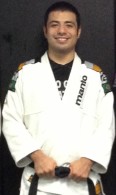 First I remained a student. I sought out coaches with a contagious excitement for the art. I make sure I prioritize traveling to other gyms and training as a student in a distraction free environment. I get to be selfish, I concentrate on my technique and don’t worry if the new white belt in the corner has his belt tied correctly. I also take advantage of online learning resources. Although I rarely make it out to his academy, Marcelo Garcia helps me stay current in BJJ around the clock via MG in Action. Rener and Ryron clean up my self-defense on Gracie University and Javier Vazquez teaches me new tricks on istagram. The online BJJ world has allowed me to always have an ace up my sleeve and prove that you can indeed teach an old dog new tricks.
First I remained a student. I sought out coaches with a contagious excitement for the art. I make sure I prioritize traveling to other gyms and training as a student in a distraction free environment. I get to be selfish, I concentrate on my technique and don’t worry if the new white belt in the corner has his belt tied correctly. I also take advantage of online learning resources. Although I rarely make it out to his academy, Marcelo Garcia helps me stay current in BJJ around the clock via MG in Action. Rener and Ryron clean up my self-defense on Gracie University and Javier Vazquez teaches me new tricks on istagram. The online BJJ world has allowed me to always have an ace up my sleeve and prove that you can indeed teach an old dog new tricks.
While training away from my home mats allows me to sharpen my sword, I make sure I still get rolling in with my students and I make sure I don’t put tapping on a pedestal. When I was a purple belt you basically had to choke me unconscious or break an extremity to induce tapping. I’ve removed the pressure of not getting tapped, it will never be the most enjoyable part of my training, but I don’t allow myself to lose sleep over it. I remember the gratitude I had towards my coaches when I submitted them and realize my mats won’t be empty because I got caught in a toe hold.
The hardest, but most im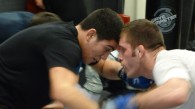 portant decision has been not overloading myself with teaching and business stress. I hired a manager and let him handle answering the phones and filling out paper work, allowing me to focus on the big picture without getting overwhelmed. I also took the time to develop a supporting cast of instructors to help me shoulder the teaching responsibilities. Aside from a handful of exceptionally dedicated professional fighters I don’t teach private lessons. I teach about 15 classes a week and I know any more and I’ll burn out. I definitely leave some money on the table by refusing privates, but it’s a small price to pay to keep my sanity. I also make sure I create a schedule that I enjoy. I’m not a morning person so I don’t teach AM classes. Sure that might cost me a few members, but I have a smile on my face every time I walk into my school and never feel like I’m at work. If I had to drag myself to a 6 AM class it wouldn’t be long before the sight of the tatami filled me with rage.
portant decision has been not overloading myself with teaching and business stress. I hired a manager and let him handle answering the phones and filling out paper work, allowing me to focus on the big picture without getting overwhelmed. I also took the time to develop a supporting cast of instructors to help me shoulder the teaching responsibilities. Aside from a handful of exceptionally dedicated professional fighters I don’t teach private lessons. I teach about 15 classes a week and I know any more and I’ll burn out. I definitely leave some money on the table by refusing privates, but it’s a small price to pay to keep my sanity. I also make sure I create a schedule that I enjoy. I’m not a morning person so I don’t teach AM classes. Sure that might cost me a few members, but I have a smile on my face every time I walk into my school and never feel like I’m at work. If I had to drag myself to a 6 AM class it wouldn’t be long before the sight of the tatami filled me with rage.
Finally, I remember why I started BJJ and all that it’s done for me and all that it continue to do for my students. Jiu-jitsu didn’t just give me cauliflower ear and a deviated septum; it gave me the confidence to hold my head up high and the ability to look someone in the eye. Another thing that helps me is talking to people who have “real jobs”. Sure it might drive me nuts when someone steps on my mat with their shoes on or a kid starts crying because their sister got a stripe and they didn’t, but that stress pales into comparison to my police officer friend who had to fight a guy on PCP or my roommate at the MTA who had to deal with a train derailing. I remember that I essentially get paid to teach my friends cool choke holds – it’s a wonderful life.
Looking for a great place to train with passionate black belts? Check out Precision MMA in LaGrange, NY
A little south of LaGrange? Be sure to check out my friends at Yonkers Jiu-Jitsu and Denville MMA
Precision MMA for self defense in the Hudson Valley
There are many joys I get to experience as a martial arts instructor, from helping a student master a difficult technique, to teaching a young child the value of hard work, to being in the corner for a championship prize fight. However, there is nothing more satisfying than stories of self defense. Knowing that the techniques you taught someone came to the rescue at the most critical juncture provides a satisfaction like nothing else.
Precision MMA is fortunate to have both incredible instructors and dedicated students. Here is the story of Nick Formichelli, a corrections officier in Dutchess County who was able to use the techniques he learned at Precision to protect himself from a hostile inmate.
Want to learn realistic self defense in the Hudson Valley? Find out what you can learn in 30 days call 845-392-8495 or visit http://www.poughkeepsiemixedmartialarts.com to get started
Brian McLaughlin MMA BJJ Highlight Precision MMA LaGrange NY
I used to be pretty good! If you like grunge music and double legs train with me at my Poughkeepsie MMA gym Precision MMA in LaGrange, NY visit www.poughkeepsimixedmartialarts.com
The #1 Mistake Entry Level MMA Fighters Make
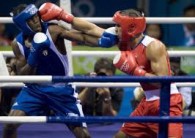 Competition is anxiety producing. Each athlete has to discover their unique coping mechanism that allows them to perform at their best despite the stress of the event. Regardless of how rigorous the training environment may be, this is not a solution that is found within the walls of the gym. No, this skill is only acquired through the exposure of standing across from a someone you know is going to do everything in their power to beat you. It is all but undeniable that wrestlers make the smoothest transition to professional MMA competition. However, I do not believe this is because wrestling is the best base skill for mixed martial arts. The vast majority of techniques from wrestling do not translate to MMA and many wrestling habits will get you destroyed when faced with a competent grappler or striker. Also, most of the wrestlers who find success in the cage only do so after adopting a striking or BJJ intensive strategy. Johnny Hendrix is known more for his devastating right hand than his great inside trip. So why then do wrestlers reach such high levels? In my estimation it is because wrestlers endure hundreds of matches in a grueling format of combative competition. Just as amateur boxers have hundreds of bouts before stepping into the professional arena, wrestlers are groomed from an early age to stand across from someone and keep themselves together. I’m sure Ben Askren cried, threw up, had rubber legs, under performed, over trained and mentally quit in many a wrestling match coming up the ranks. Somewhere along the line though he zoned in and found his way to win and that mental fortitude laid the foundation for a successful professional career. For those who dream of wearing UFC gold, delay the gratification of being a pro and enjoy your time as an amateur. Take your loses in stride and find new ways to challenge yourself across as many disciplines as possible.
Competition is anxiety producing. Each athlete has to discover their unique coping mechanism that allows them to perform at their best despite the stress of the event. Regardless of how rigorous the training environment may be, this is not a solution that is found within the walls of the gym. No, this skill is only acquired through the exposure of standing across from a someone you know is going to do everything in their power to beat you. It is all but undeniable that wrestlers make the smoothest transition to professional MMA competition. However, I do not believe this is because wrestling is the best base skill for mixed martial arts. The vast majority of techniques from wrestling do not translate to MMA and many wrestling habits will get you destroyed when faced with a competent grappler or striker. Also, most of the wrestlers who find success in the cage only do so after adopting a striking or BJJ intensive strategy. Johnny Hendrix is known more for his devastating right hand than his great inside trip. So why then do wrestlers reach such high levels? In my estimation it is because wrestlers endure hundreds of matches in a grueling format of combative competition. Just as amateur boxers have hundreds of bouts before stepping into the professional arena, wrestlers are groomed from an early age to stand across from someone and keep themselves together. I’m sure Ben Askren cried, threw up, had rubber legs, under performed, over trained and mentally quit in many a wrestling match coming up the ranks. Somewhere along the line though he zoned in and found his way to win and that mental fortitude laid the foundation for a successful professional career. For those who dream of wearing UFC gold, delay the gratification of being a pro and enjoy your time as an amateur. Take your loses in stride and find new ways to challenge yourself across as many disciplines as possible.
Even more important though, find a good gym to train at, if you’re in the Poughkeepsie area check out Precision MMA in LaGrange, NY and if you find yourself in Morris County, NJ check out Pure Mixed Martial Arts.

